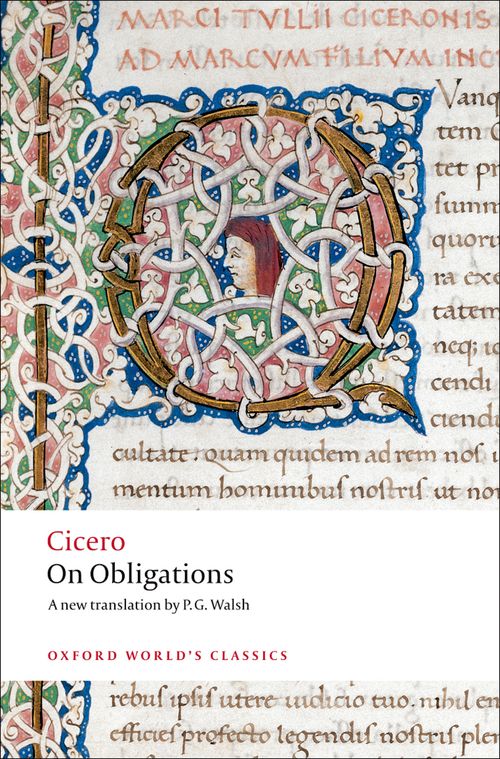Home >
Oxford World's Classics >
On Obligations: De Officiis (Classics and the Ancient World)
Oxford World's Classics: Classics and the Ancient World | Classics and the Ancient World
On Obligations: De Officiis
ISBN: 9780199540716
Series: Oxford World's Classics: 古典・古代
On Obligations: De Officiis (Classics and the Ancient World)
Oxford World's Classics: 古典・古代 On Obligations: De Officiis (Classics and the Ancient World) メディア > 書籍 > ノンフィクション > 言語学習書 Expect Delays of Up to 4 Weeks| ご注文はこちら |
ISBN
9780199540716 (旧規格ISBN: 0199540713)
- 説明
- シリーズの説明
作家名:キケロ
放題:義務について
On Obligations (De officiis) was written by Cicero in late 44 BC after the assassination of Julius Caesar to provide principles of behaviour for aspiring politicians. It explores the apparent tensions between honourable conduct and expediency in public life, and the right and wrong ways of attaining political leadership. The principles of honourable behaviour are based on the Stoic virtues of wisdom, justice, magnanimity, and propriety; in Cicero's view the intrinsically useful is always identical with the honourable. Cicero's famous treatise has played a seminal role in the formation of ethical values in western Christendom. Adopted by the fourth-century Christian humanists, it beame transmuted into the moral code of the high Middle Ages. Thereafter, in the Renaissance from the time of Petrarch, and in the Age of Enlightenment that followed, it was given central prominence in discussion of the government of states. Today, when corruption and conflict in political life are the focus of so much public attention, On Obligations is still the foremost guide to good conduct.
放題:義務について
On Obligations (De officiis) was written by Cicero in late 44 BC after the assassination of Julius Caesar to provide principles of behaviour for aspiring politicians. It explores the apparent tensions between honourable conduct and expediency in public life, and the right and wrong ways of attaining political leadership. The principles of honourable behaviour are based on the Stoic virtues of wisdom, justice, magnanimity, and propriety; in Cicero's view the intrinsically useful is always identical with the honourable. Cicero's famous treatise has played a seminal role in the formation of ethical values in western Christendom. Adopted by the fourth-century Christian humanists, it beame transmuted into the moral code of the high Middle Ages. Thereafter, in the Renaissance from the time of Petrarch, and in the Age of Enlightenment that followed, it was given central prominence in discussion of the government of states. Today, when corruption and conflict in political life are the focus of so much public attention, On Obligations is still the foremost guide to good conduct.
Oxford World’s Classics は、誰もが知る有名な物語から一般読者にはなじみの薄い隠れた名作まで、古典や文芸作品の数々を100年以上に渡り提供し続けているオックスフォード大学出版局を代表する叢書です。 現在メソポタミア神話から20世紀小説の名著まで、約770タイトルを刊行しており、各作品に相応しい専門家を校訂者に迎え、原典に解題、注釈、年代記、関係書目を付して紹介しています。必要に応じ、地図や用語集、索引、図版等の付録をつけているほか、読者に最新の研究動向を踏まえた作品理解を促すべく、定期的な新刊の追加や、既刊タイトルの改版を行っています。
(注意:本書は、原文を掲載した書籍です。グレイデッド・リーダーではありません)
作家名:キケロ
放題:義務について
On Obligations (De officiis) was written by Cicero in late 44 BC after the assassination of Julius Caesar to provide principles of behaviour for aspiring politicians. It explores the apparent tensions between honourable conduct and expediency in public life, and the right and wrong ways of attaining political leadership. The principles of honourable behaviour are based on the Stoic virtues of wisdom, justice, magnanimity, and propriety; in Cicero's view the intrinsically useful is always identical with the honourable. Cicero's famous treatise has played a seminal role in the formation of ethical values in western Christendom. Adopted by the fourth-century Christian humanists, it beame transmuted into the moral code of the high Middle Ages. Thereafter, in the Renaissance from the time of Petrarch, and in the Age of Enlightenment that followed, it was given central prominence in discussion of the government of states. Today, when corruption and conflict in political life are the focus of so much public attention, On Obligations is still the foremost guide to good conduct.
放題:義務について
On Obligations (De officiis) was written by Cicero in late 44 BC after the assassination of Julius Caesar to provide principles of behaviour for aspiring politicians. It explores the apparent tensions between honourable conduct and expediency in public life, and the right and wrong ways of attaining political leadership. The principles of honourable behaviour are based on the Stoic virtues of wisdom, justice, magnanimity, and propriety; in Cicero's view the intrinsically useful is always identical with the honourable. Cicero's famous treatise has played a seminal role in the formation of ethical values in western Christendom. Adopted by the fourth-century Christian humanists, it beame transmuted into the moral code of the high Middle Ages. Thereafter, in the Renaissance from the time of Petrarch, and in the Age of Enlightenment that followed, it was given central prominence in discussion of the government of states. Today, when corruption and conflict in political life are the focus of so much public attention, On Obligations is still the foremost guide to good conduct.
シリーズの説明
Oxford World’s Classics は、誰もが知る有名な物語から一般読者にはなじみの薄い隠れた名作まで、古典や文芸作品の数々を100年以上に渡り提供し続けているオックスフォード大学出版局を代表する叢書です。 現在メソポタミア神話から20世紀小説の名著まで、約770タイトルを刊行しており、各作品に相応しい専門家を校訂者に迎え、原典に解題、注釈、年代記、関係書目を付して紹介しています。必要に応じ、地図や用語集、索引、図版等の付録をつけているほか、読者に最新の研究動向を踏まえた作品理解を促すべく、定期的な新刊の追加や、既刊タイトルの改版を行っています。
(注意:本書は、原文を掲載した書籍です。グレイデッド・リーダーではありません)
EASY ORDER FORM
表示価格が税込価格
価格(税抜):
2,180 円


